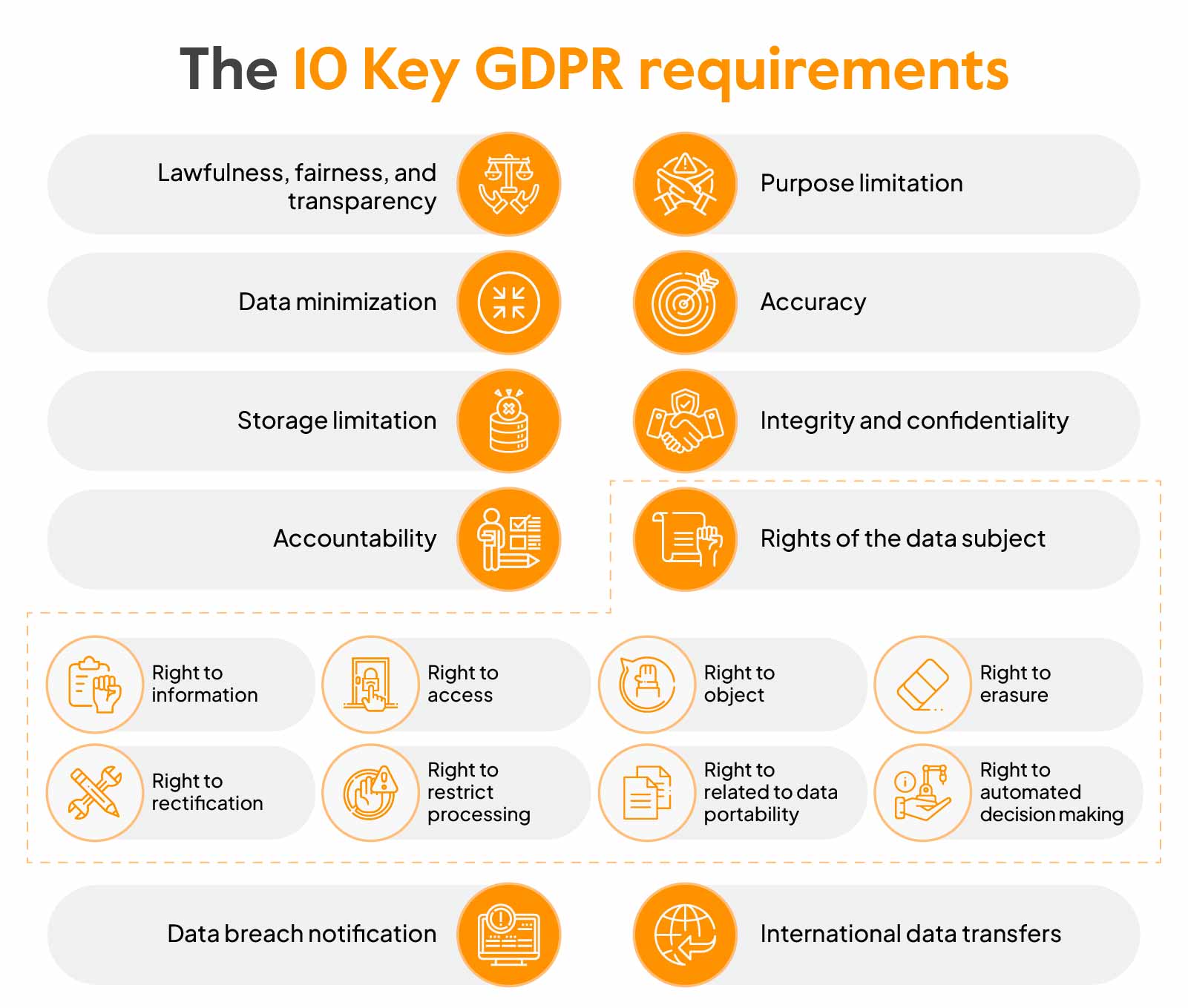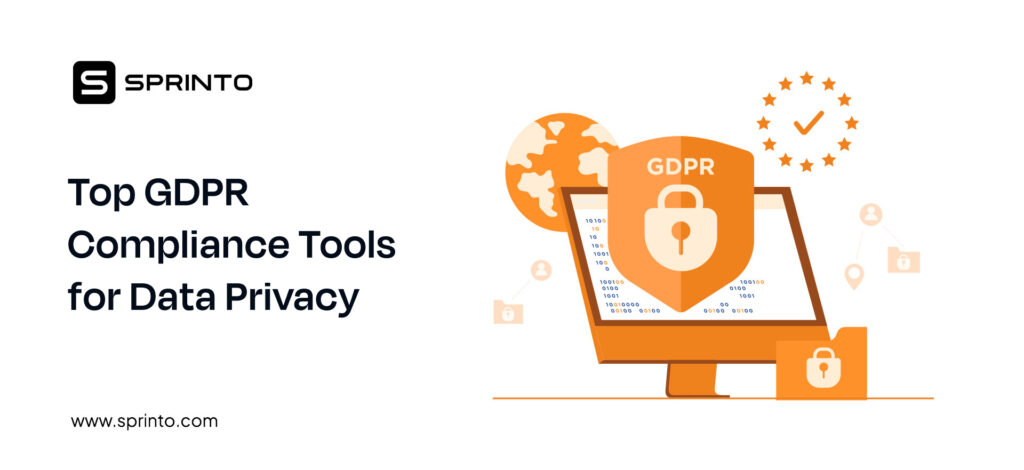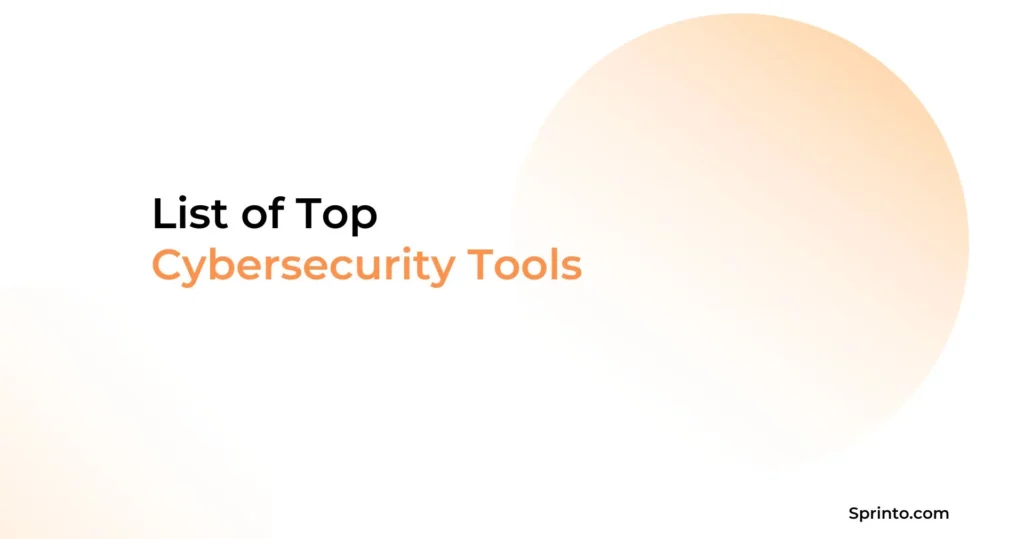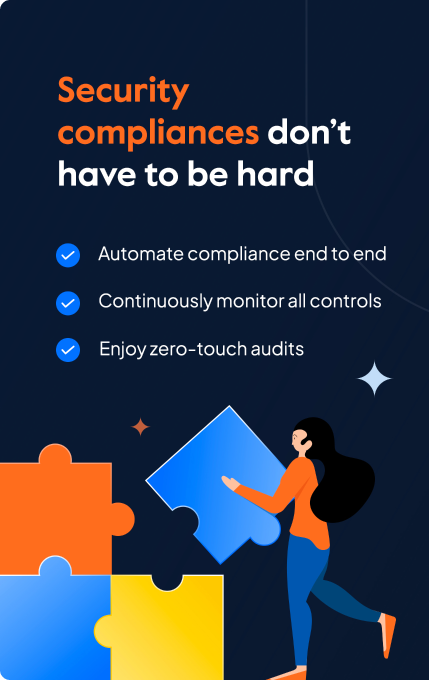
In 2017, 83000 data protection officers (DPOs) were appointed; now, there are over half a million! This 700% increase in the demand for DPOs has been majorly attributed to GDPR implementation requirements. Intrigued by this surge in demand for data protection expertise?
GDPR is said to be one of the most rigorous data protection laws to exist with the plethora of demands companies are required to fulfill. A representative from Noosa, stated this while talking to Sprinto: “We once hired an external consultant who gave us an idea about the implementation, but it was very, very high level.”
The Principles, the rights of individuals, breach notification mandates, documentation, and more; there’s a lot to catch up under GDPR.So, in this blog, we aim to demystify the requirements in an easy-to-grasp language. Keep reading for a quick and painless understanding of the GDPR essentials, and learn how Sprinto can help you through the process.
What are GDPR requirements?
The GDPR requirements mandate that organizations maintain accurate records of their data processing activities so that they are continuously updated. Data mapping involves systematically documenting the company’s data flows to create an inventory and keep it current over time.
The main requirements of GDPR are:
- Companies should process their data in a lawful, fair, and transparent manner
- Companies should only collect the data that is necessary
- Data subjects have the right to ask what information the company asks for
- Companies are required to gain explicit consent from the data subject
- Companies should maintain a Personal Data Breach Register
- Companies should incorporate privacy by design mechanisms to protect data
- Companies must conduct a (DPIA) Data Protection Impact Assessment
- Controllers should have the obligation to ensure data protection during data transfers
- Companies must appoint a Data Protection Officer
- Companies are mandated to provide their employees with security and data-handling training
Why are GDPR requirements important?
By adhering to key GDPR principles and requirements around transparency, individual control, and data protection, GDPR aims to build user trust and enable responsible information use by organizations. Here’s why GDPR requirements are important.
- While meeting GDPR data privacy requirements can be challenging, the principles provide meaningful privacy rights – giving people more control around consent, access, and deletion.
- Adhering to GDPR promotes transparency about data collection/use, upholding individual choice and agency.
- GDPR also mandates better security to safeguard sensitive customer information, helping build user trust and confidence.
- Though achieving full compliance is an ongoing process, the GDPR moves organizations in the right direction regarding privacy practices and cyber protections.
- By valuing privacy, enabling user control, and securing personal data, the GDPR aims to enable responsible information use in the modern economy.
Learning the importance of GDPR requirements
Who needs to comply with GDPR requirements?
GDPR requirements apply to any company or entity whose core activities include the collection or processing of personal data of EU citizens, regardless of its location, needs to comply with GDPR requirements. In this regard, it applies to:
- Controllers who identify the purpose of data collection and take decisions on means to collect it.
- Data processors who process the personal data of individuals.
Also find out: GDPR compliance checklist for US companies
You can be fined for not meeting GDPR requirements. Check out this detailed video to learn more on GDPR fines:
10 key GDPR requirements
Before seeking any legal advice and chalking out plans for GDPR implementation, it is crucial to grasp the requirements. This sets the foundation for compliance initiatives and eliminates the possibility of fall-throughs.
But before you go ahead to understand the requirements, here is a simple GDPR audit checklist you need be aware of:
Download Your GDPR Audit Checklist
Here are the 10 key GDPR requirements you must know as adherence to them will help you get GDPR compliant faster. They are:
- Adherence to law, justice, and transparency
- Purpose limitation
- Minimization of data
- Accuracy
- Storage limitation
- Integrity and confidentiality
- Accountability
- Rights of the data subject
- Data breach notification
- International data transfers

Adherence to law, justice, and transparency
The requirements related to the lawful, fair, and transparent collection of data are set forth in Article 5 of GDPR. According to this article, there should be a legal basis for data collection and clear communication on how the data is being used.
The data can only be legally processed in the following cases:
- When consent is freely given
- For performance of a contract
- For legal obligations say, tax reporting
- For legitimate interests like fraud detection
- With vital interest like processing personal medical information in case of emergency
- For performance of public tasks such as issuing a government document
Check out: Guide to GDPR data mapping
Purpose limitation
Article 5(1)(b) of GDPR outlines what comes under the scope of purpose limitation. According to this requirement, the collection of data must be for a purpose which is lawful, specific, and documented. It requires clarity on the intent of data collection. Any additional processing must align with the specified purpose, failing which the data must be purged.
Data minimization
As laid down in Article 5(1)(c), data minimization focuses on gathering data at the bare minimum that allows for the function or process to be carried out. This helps in avoiding excessive collection and prevents misuse. The article stipulates that collection and processing of data must be:
- Limited: Any personal information that is unnecessary for the specified purpose must not be collected
- Adequate: There should be sufficient data to meet the intended purpose
- Relevant: The data collected must fit the intended purpose
Find out: what is GDPR cookie consent
Accuracy
Article 5(1)(d) talks about the accuracy of data, which means that personal data collected must be a reliable and consistent source of truth. It must be error-free and true to the best of the data collector’s knowledge. It is important to note that the data must be up-to-date in order to assure accuracy.
In case of any inaccuracy, the following must be carried out:
- Data rectification: This can include correcting, updating, or adding any missing data
- Data erasure: If the data is inaccurate and the purpose of collection is no longer relevant, the data must be erased
Storage limitation
The storage limitation requirement, i.e., Article 5(1)(e) presses the importance of having ‘data retention’ policies in place. Data collectors must decide explicit timeframes for retaining personal information. It also stipulates that the data must be deleted or anonymized after the given timeframe. There must be periodic reviews that monitor the practice of storage limitation.
Integrity and confidentiality
Article 5(1)(f) focuses on protecting the integrity and confidentiality of data. Integrity refers to the dependability of the collected data. In order to ensure integrity, organizations must initiate measures that prevent compromise by way of alteration, tampering, destruction, or unauthorized access.
Confidentiality states that only authorized people should have access to sensitive or personally identifiable information. Under GDPR law, technical and organizational methods must be employed to protect personal data from being exploited. These can be in the form of data encryption, access controls, employee training, regular monitoring, etc.
Check out: GDPR compliance guide
Accountability
Accountability, under the GDPR, requires organizations to take ownership for data protection of individuals and exhibit their commitment to compliance. Article 5(1))(g) mandates data controllers or data protection officers hold collective responsibility over this aspect.
This means that there should be proper maintenance of records, reports of breaches, and implementation of data protection measures.GDPR also advocates the use of Data Protection Impact Assessment (DPIA) to identify risks and initiate mitigation measures proactively. When data processing is done on an extensive scale, there can be high risks of privacy infringements. DPIAs in such scenarios help assess risks and determine the proportionality of measures needed to mitigate damage.
Rights of the data subject (GDPR data privacy requirements)
To ensure data privacy of EU citizens, GDPR affords them the following rights:
- Right to information (Articles 13 & 14): Individuals have the right to know about how and when their data is being processed.
- Right to access (Article 15): Data subjects can request a copy of the data being processed. They can also request information on the processing activities, such as the purpose and the period for which the data will be held.
- Right to object (Article 21): EU citizens can disapprove the processing of their personal data for purposes they do not deem fit.
- Right to erasure (Article 17): Data subjects can request that their data must be erased in cases where the data is no longer needed or consent is withdrawn. However, holding data for any legal obligation or public task is exempted.
- Right to rectification (Article 16): Individuals can request correction of incorrect or inaccurate data.
- Right to restrict processing (Article 18): Individuals can restrict the processing of their personal data for purposes they do not approve. In such cases the restrictions in data processing must be complied with.
- Rights related to data portability (Article 20): If the data subjects choose, they can transmit the data to third-party data controllers. They can demand a copy of their personal data for these purposes.
- Right to automated decision-making (Article 22): In cases where there’s automated decision-making while data processing, it is essential that individuals are informed about it. They have the right to demand intervention or object to the processing of data.
Data breach notification
The GDPR has clearly laid down timelines for prompt notifications in case of data breaches. Data controllers or data protection officers, as the accountable authority, should notify DPA (Data protection authority) in the relevant EU state about the breach as soon as they come to know about it and not later than 72 hours after the incident. DPAs can then initiate investigations and demand corrective measures.
In case of high risks, data subjects should also be informed about the breach without delays.
International data transfers
Any transfer of data outside the European Union is an international data transfer and is subject to certain requirements. The European Union will issue an ‘adequacy decision’ for the country that receives the data after evaluating the strength of its data protection laws and safeguards. Contractual clauses or Binding Corporate Rules (BCRs) might be issued in cases where adequacy decisions do not apply.
Check out the list of best GDPR compliance tools.
Need to meet GDPR standards? Our “GDPR Data Processing Agreement” is here to help. Download this essential document to ensure your data processing aligns with regulations.
Download Your Data Processing Agreement Template
How Sprinto can help you meet GDPR requirements?
With data privacy regulations like GDPR in place, businesses need to take data compliance seriously. This is where Sprinto comes in. Sprinto is compliance automation software designed specifically to help companies meet the very requirements outlined in GDPR.
With features like control mapping, risk analysis, integrated consent management, and granular policy management, Sprinto makes it easy to get a handle on your data. It can scan your systems, identify sensitive information, document the lawful basis for processing that information, and so much more. Plus, Sprinto centralizes and organizes all GDPR compliance activity for easy reporting and auditing.
Sprinto provides the specialized tools needed to comply with complex regulations like GDPR, HIPAA, and more. Rather than leaving GDPR compliance up to manual processes, leverage Sprinto’s automation and expertise in this area. It’s simply the smarter route to GDPR readiness.
Get GDPR ready in weeks
Sprinto speeds up GDPR-readiness
GDPR requirements are quite demanding and comprehensive. Ambiguity and mistranslations take a lot of time for companies. However, non-fulfilment leads to limited market access and missed business opportunities. That’s probably why 27% of businesses have spent more than half a million dollars to become GDPR compliant. The amount didn’t have to be that big though.
Automation of GDPR compliance with tools like Sprinto is the most efficient way to gain GDPR compliance. Not only does it help you avoid the time-consuming aspect of GDPR compliance, but it is a lot more cost-efficient.
Sprinto’s ready-to-use privacy policies, comprehensive training modules, integrated risk assessments, and automated data collection make GDPR compliance easy and effortless. Every step is managed end-to-end, and standardized measures make the processes a lot less time-consuming. Learn how Noosa.io became GDPR-ready in just 14 sessions with us. Ready to talk? Reach out to our experts here.
What are the fines and penalties in case of GDPR non-compliance?
Depending upon the severity of the data breach, GDPR has divided penalties and fines into two tiers.
Tier 1: Up to €20 million or 4% of worldwide annual turnover whichever is higher. Tier 1 breaches are related to basic principle violations like lawfulness, transparency etc.
Tier2: Up to €10 million or 2% of worldwide annual turnover whichever is higher. Tier 2 breaches relate to certain specific circumstances like GDPR certifications, data processor’s obligations etc.
What kind of information does the GDPR apply to?
Any information that is personally identifiable comes under the scope of GDPR. This can be basic personal information like name, email, phone etc., financial information, online identifiers like IP address, employee records or any such other sensitive data.
Is GDPR compliance mandatory?
Yes, GDPR compliance is necessary for any entity that collects or processes the personal data of EU residents. Hence, any organization that deals with such personal data must comply GDPR data privacy requirements.
Is a data breach a criminal conviction as per GDPR?
Data breach is a criminal offense only if you knowingly or recklessly disclose or obtain personal data without the data controller’s consent.
Payal Wadhwa
Payal is your friendly neighborhood compliance whiz who is also ISC2 certified! She turns perplexing compliance lingo into actionable advice about keeping your digital business safe and savvy. When she isn’t saving virtual worlds, she’s penning down poetic musings or lighting up local open mics. Cyber savvy by day, poet by night!
Explore more
research & insights curated to help you earn a seat at the table.






















